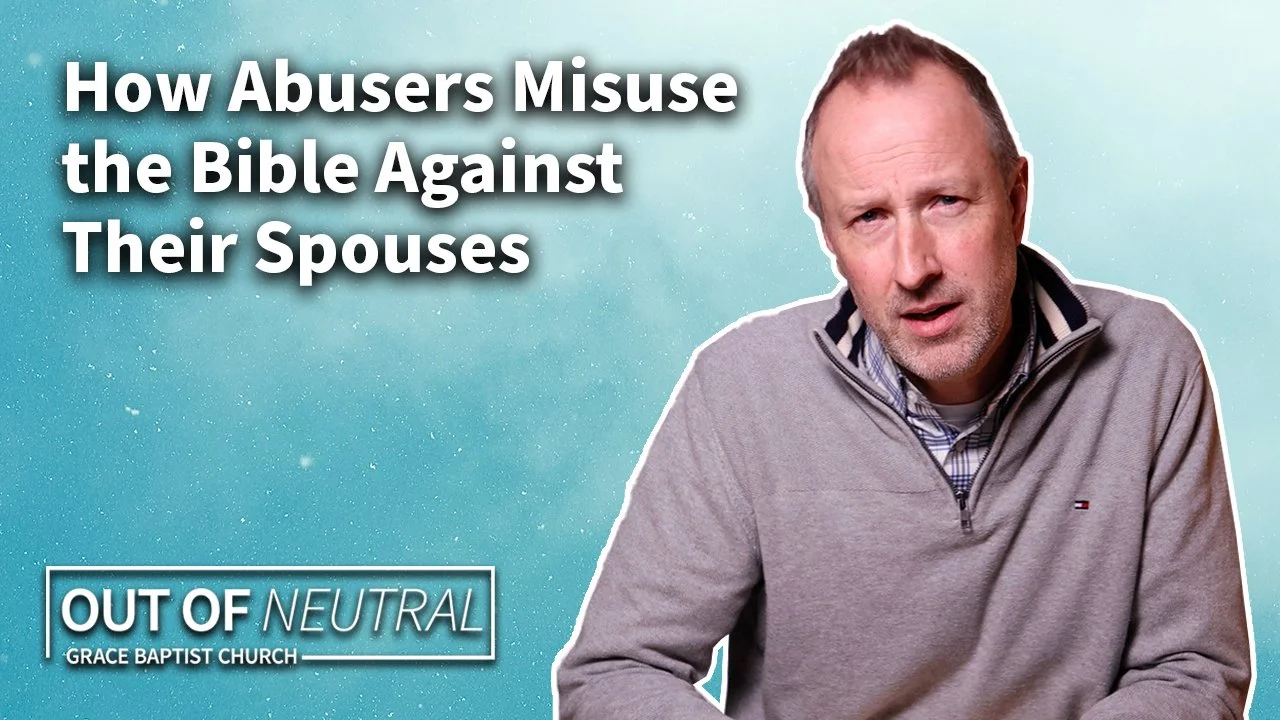Click on the image above for the video of this article or keep reading below for the text version.
This week, I had a strange experience with two books on marriage. I finished reading Darby Strickland’s book, “Is It Abuse?” and started reading Tim and Kathy Keller’s book, “The Meaning of Marriage.” Both of them are excellent. Both of them address the topic of marriage from the Scriptures. But it’s as if they’re addressed to people from two different worlds. The first helps people to identify whether domestic abuse is present in a relationship and gives strategies for addressing it. The second helps people discover how a marriage can become all it was intended to be. Reading one gave me new awareness in reading the second. I realized that in only approaching marriage from the ideal that the Bible presents, there are principles that can be misunderstood and even used by abusers to manipulate their spouses. Consider the following examples.
1. Leave and cleave
The Bible makes it clear that marriage is the priority human relationship. In Genesis 2:24, where marriage is introduced for the first time it says, “Therefore a man shall leave his father and his mother and hold fast to his wife, and they shall become one flesh.” Leaving your parents is contrasted with “holding fast” to your spouse as a way of expressing a shift in primary loyalties as the couple forms a new family unit. The King James uses the words “leave” and “cleave.” In a healthy marriage, this is an important principle to avoid unhealthy dependence on and interference from parents. The goal of an abuser however is to control, and one of the key ways they maintain control is by isolating their spouse. An abusive spouse wants theirs to be the only voice that is ever heard, and so they often misuse this principle to cut their partner off from their family’s counsel and support. Using Scripture to justify oppressive isolation should be a danger signal to a spouse.
2. Submit to your husband
Rightly understood, the biblical concept of submission can be a beautiful quality in healthy marriages. Ephesians 5:22 says, “Wives, submit to your own husbands, as to the Lord.” Unfortunately, this principle is corrupted and distorted by abusive men who use it to justify their own entitlement. They use it as a means of control and domination completely apart from God’s intention. Submitting to a husband who lays down his life for his wife (Ephesians 5:25), loves and cares for her as much as he does himself (Ephesians 5:28), seeks to meet her needs (Ephesians 5:29), and shows loyalty to her above else (Ephesians 5:31) is completely different than submitting to a man who wants to use the Bible to get his own way and defend his selfishness. Where a spouse is violent, domineering, or controlling, the appeal to “submission” is an oppressor’s ploy not a genuine plea for godliness.
3. Your body is not your own
The Bible teaches that marriage involves a profound unity where two become one. In an ideal marriage, there is a wonderful sharing and focus on each other’s needs at an emotional, spiritual, and physical level. It’s in that context that 1 Corinthians 7:4 says, “For the wife does not have authority over her own body, but the husband does. Likewise, the husband does not have authority over his own body, but the wife does.” The idea is that in marriage you belong to one another in mutual sharing and commitment. Abusers pervert this principle and make it one-sided. They use it as an excuse to control and dominate the other person and don’t concede the mutuality that is present in the verse itself. God’s Word is never given to justify entitlement or selfishness in a relationship.
4. You made me sin
The final principle is not so much a direct command that gets distorted by abusers but the use of the Bible to shift blame. Strickland talks about the tendency of oppressive spouses to blame their own sinful actions (e.g., angry outbursts, drunkenness, violence, use of pornography) on their partners. But the Bible says that people are responsible for their own actions. Nothing you do can ‘make me sin,’ so I never have a right to say, ‘If you had done this for me, I wouldn’t have lost control like that.’ Jesus said, “What comes out of a person is what defiles him.” (Mark 7:20) and James taught that “… each person is tempted when he is lured and enticed by his own desire. Then desire when it has conceived gives birth to sin …” (James 1:14-15). When a spouse blames you for their sin, it’s an excuse and another attempt to control you.
I think it’s right that we all pursue the ideal of marriage, but it’s important to be aware of the ways that people can seek to not only distort that ideal but actually corrupt the very teachings that support it. For anyone trying to sort out these issues, I would recommend Strickland’s book, “Is It Abuse? A Biblical Guide to Identifying Domestic Abuse and Helping Victims.”
In awe of Him,
Paul











